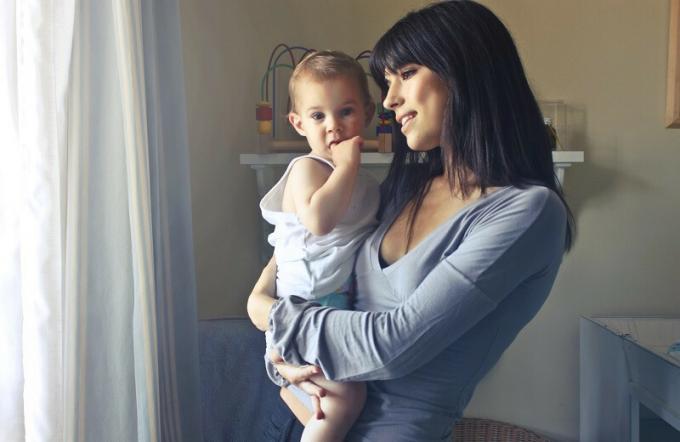Maternal bond and mental health
There is a direct relationship between the structure of our personality and the way in which the affective bond with our mother was carried out.
This powerful bond that is formed from the very moment of conception, programs us psychically to face life in one way or another.
- Related article: "The Theory of Attachment and the bond between parents and children"
Characteristics of the maternal bond
What happens during the entire gestation period, the way in which the birth occurs and the experiences lived up to more or less 6 years of age, are determining aspects for set behavior patterns that will be displayed throughout our lives. Of course, obviously, situations will continue to arise from our environment that will continue to feed our psyche and influence decision-making and our way of behaving.
Dr Bruce H. Lipton, in his book The biology of belief, talks extensively about the subject, breaking paradigms about what was believed regarding genetics. This prestigious Cellular Biologist introduces his studies on epigenetics, a field of science that studies the activation of genes as factors that affect development because they can be modified according to the environment with which we interact
In other words, at the first level of affectation, it is not the genes that affect human behavior, it is our parents that have an effect on us at this leveleven before birth. And this is due not only to the fact that they transmit their genetic material to us, but also to the environment in which our mother develops, it can drastically affect us.
- You may be interested: "Family therapy: types and forms of application"
Its implications for mental health
This is a topic that is addressed a lot in therapy processes, due to the fact that children, adolescents or adults present many difficulties in their relationships with themselves or with their parents or their partners. The circumstances surrounding her upbringing have been decisive in forming the necessary or unnecessary structures to face life.
Next, I expose the environments and experiences that directly and negatively affect the baby and the mother. In this sense, it is necessary to understand in depth the leading role of the father in this process.

The first person that the mother needs to achieve positive emotional states during pregnancy is the father of her child. The health of the baby, in the emotional psychological field, depends to a great extent on the accompaniment of the father, and to this we must also add the psychological states that belong exclusively to the mother, because these also depend on the circumstances of her upbringing, returning to the bond between her and her parents, which what can create a chain of very dysfunctional and painful situations, leading the mother and father to repeat patterns of behavior that continue to damage the human psyche of the new being, in this case her son.
- Related article: "Developmental Psychology: main theories and authors"
The phenomenon of stress
There is a lot of information about the negative effects of stress. If the mother is stressed while she is pregnant, it is much more likely that the baby will be born with stress problems.
A stressed child is very weepy, sleeps little, is irritable and prone to diseases because his immune system is affected. When they are older, they can present hyperactivity, language and socialization problems.
There are many reasons that can stress the mother, and the main one we already mentioned before, when We talked about the importance of accompanying the father throughout the process of pregnancy and child rearing. baby.
Other reasons that cause you stress go hand in hand with circumstances related to unplanned pregnancies. The fact of experiencing pregnancy and not accepting it in the full sense of the word implies recurrent thoughts and emotions of rejection towards the baby.
- You may be interested: "5 signs of poor mental health that you should not overlook"
The long-term effects of problems
In most cases, the consequences in the children due to the lack of emotional bond with the mother during the first childhood have to do with behaviors of disobedience, very frequent anger, indiscipline, tantrums, poor school performance etc. When these boys or girls grow up, they develop behaviors framed within unfounded fears, low self-esteem, a tendency to commit crimes or take drugs, and they have a tendency to develop and maintain very toxic relationships, because they unconsciously hold a lot of resentment towards their mother and also towards her father.
There are other factors that negatively influence the gestation of the baby. These special circumstances, even if it is a wanted pregnancy, influence the psycho-emotional health of both the mother and the baby. When the mother is not in good health, when she works, studies, when she does not eat well or sleep well, etc.
When you are a single mother It is usual that the closest environment of that person (their parents and/or their partner) do not agree at all with this situation and cause them a lot of pain and suffering due to the constant reproaches; In addition, fear may arise in the face of this totally new situation for her.
Not everything is written in the books, but from the experience in the approach in therapy, when inquiring about the problems that are generated within coexistence In general, these have to do with dysfunctional relationships, where he or she finds it very difficult to create situations that make their partner happy. partner.
To do?
In order to create happiness on the outside, you must first do it on the inside.. If in our unconscious there is wrong information due to affective bonds not created healthily, with that information in tow, we will try to live and recreate them with our partner and family.
Therapy processes are extremely healing for these and other circumstances that arise in human life. You just have to make the decision to learn to leave the past, to live a present full of satisfaction and joy, which translates into happy couples and families, which will give rise to more aware societies and healthy.

